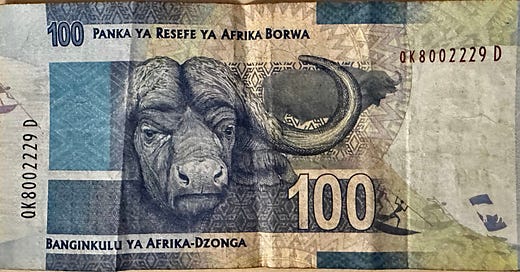🔅 Oops! S.Africa's R100 Banknote Has a Spelling Error
Plus: 🇬🇳 Guinea's Military Government Under Fire, 🇳🇬 Shell Gets a Pass on Nigerian Oil Spill, 🇪🇹 Pesticide Overload in Ethiopia Costs the Country $500m, ☕ And much more...
Photo of the day: Madagascar

Markets:
🔻 Nigerian SE: 52,161.24 (-0.09%)
🔻 Johannesburg SE: 77,775.02 (-1.22%)
🔻 Ghana SE: 2,710.06 (-0.02%)
🔻 Nairobi SE: 98.34 (-2.16%)
🔻 US S&P 500: 4,129.15 (-0.21%)
🔻 Shanghai Composite: 3,309.55 (-0.29%)
Safaricom: Taking a Hit to Go Global | Kenyan telecoms operator Safaricom is taking a hit in the wallet in order to expand its business to Ethiopia. The group's core earnings fell by a fifth in the year to March 31 due to the costs of setting up shop in Ethiopia, but CEO Peter Ndegwa believes it’s worth it. They’ve already signed up two million active users and have been awarded a mobile financial services license. Unfortunately, Safaricom’s stock has taken a nosedive, losing more than a third of its value this year due to global market volatility and a dollar shortage in Kenya.
*Data accurate as of the close of markets across the continent
ECONOMY
Oops! S.Africa's R100 Banknote Has a Spelling Error

The South African Reserve Bank (SARB) recently unveiled its new R100 banknote – but apparently, it came with a spelling error.
First, what are the new banknotes like?
The new note retains the “Big Five” animals and Nelson Mandela’s face, but the notes have been designed to emphasise family, with adult animals and their offspring depicted.
There are also changes to their colour.
So what did they get wrong?
The mistake has been spotted among the Xitsonga-speaking communities. On the ‘old’ R100 notes, the Xitsonga translation for ‘Reserve Bank’ was written as ‘Banginkulu’. On the new note, the translation reads ‘Bangikulu’, with the second ‘N’ dropped.
The Pan South African Language Board, which was responsible for the translation, said that the extra ‘N’ was incorrect on the ‘old’ notes, and that it is only used when referring to a person, not an institution.
But Xitsonga-speaking communities dispute this explanation, arguing that the ‘N’ is necessary and that removing it changes the meaning of the word.
They have blamed the lack of consultation with language experts as the cause for the misspelling.
The SARB has since said that it is currently looking into the issue, and will work with language experts to come to an agreement.
Share Baobab with friends and colleagues for free daily updates on African business, money, and current affairs.
OTHER HEADLINES
Across the Continent
🇬🇳 Guinea's Military Government Under Fire | The West African nation is in the middle of yet another wave of anti-government protests, with police in riot gear cracking down on demonstrators who are throwing rocks and burning tires. So far, at least seven people have been killed and 32 wounded in the capital city of Conakry and other cities. The military government that seized power in 2021 has yet to respond to the allegations, but they have proposed a two-year transition to democracy—which, as far as protesters are concerned, isn't fast enough.
🇳🇬 Shell Gets a Pass on Nigerian Oil Spill | Bad news for Nigerians living in the oil-producing Niger Delta: the UK Supreme Court ruled on Wednesday that it was too late to sue Shell over a 2011 offshore oil spill that reportedly had a devastating long-term impact on the coastal area. Shell had been fighting the case for years, denying that the spill had polluted the land and waterways, and the court didn’t even have to rule on the facts of the case because the legal deadline had already passed. Two brave Nigerian citizens had tried to fight the ruling, but alas, their efforts weren’t enough to overturn the decision. Shell said the Supreme Court ruling had “brought to an end all legal claims in English courts” related to the spill.

🇪🇹 Pesticide Overload in Ethiopia | In Ethiopia, pesticide use got so out of hand that honeybees were dropping like flies. A new study estimates that billions of honeybees died or abandoned their hives in Ethiopia between 2019 and 2021, thanks to the increased use of synthetic pesticides to control swarms of locusts. And honey production has plummeted by 80%, costing the country $500 million in losses. However, this isn’t just a honey problem—the lack of pollinators could lead to an ecosystem-wide disaster.

FOOD FOR THOUGHT
Proverb of the Day
“The only time you will see a quiet snake is when it has swallowed another snake.”
— Kenyan Proverb.





